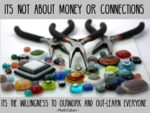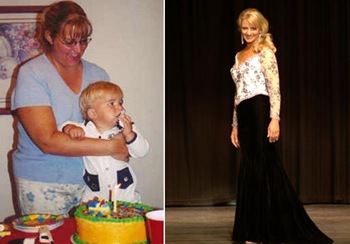Last updated on July 6th, 2022 at 10:42 am
Today’s post is about how accomplishing my dream of personal finance mastery is going to require more than a technical change. It’s going to require adaptive change.
A technical change is a skill or a task you can learn, like balancing the checkbook, monitoring the bank balance, or waiting 24 hours before making any unplanned purchases.
An adaptive change is a shift in values, beliefs, and underlying behavior.
It can be safely concluded that:
- A technical change cannot really take hold unless it is accompanied by an adaptive change (this is why diets do not work); and
- An adaptive change is harder to accomplish than a technical change, so a lot of times we skip it. This is why so many of us are still overweight, even if we’ve been on diets.
I recently realized I need to consider some adaptive changes in my financial life. The realization came to me as a result of a passing comment made by one of my clients. He said: “I don’t like being under-capitalized.”
Did I think to myself: huh? What means under-capitalized? So, like a good coach, I asked him.
There followed a detailed story about the time he was building a house at the same time he was renovating his office and how he spent many a night lying awake, mentally calculating whether he should pay for the window glass or the carpet, and what each choice would mean in terms of delay, cost overruns, and unforeseens.
Aha.
Being under-capitalized means “not having enough money.”
News flash. I don’t like being broke either!
But the more I thought about it, the more the term “under-capitalized” seemed like something subtly other than “being broke.”
Being broke has a bum-sounding quality to it, with no small tinge of ineptitude. It’s mildly amusing to hear someone say, “There was more month at the end of my money.” But as my long-time best friend Dave says to me whenever I shrug off circumstances I believe I can’t control, “Too passive!”
Being under-capitalized sounds more sophisticated, wise, or intentional somehow – and not just because it’s a $65 dollar word. Indeed, what is capital? According to my computer system’s convenient dictionary:
Capital (n): wealth in the form of money or other assets owned by a person or organization or available or contributed for a particular purpose such as starting a company or investing.
Several words jump out at me: “owned,” “available,” and “particular purpose.”
I’m not going to look those up in the dictionary, but I am going to invite you to consider them with me.
When I think of being broke, I don’t have a mindset of owning money. It feels more like money is passing by on the way from somewhere to somewhere else, with me as the conduit. I exert no real control, nor do I add any value. (My inner Dave whispers: “Too passive!”)
“Undercapitalized” feels much more owner-ish.
Capital sounds like something that makes life goals and experiences possible. Capital is an asset, and assets require care and nurturing. Cash is to capital as renting is to owning. You’ll keep the rental clean, but you’ll enhance and maintain the home you own. With an asset, there’s a contribution you’re called on to make to conserve and add value.
Cash may as well pass me right by, but capital – that takes some effort on my part.
And what about “available?” When I’m broke, the concept of availability is about cash flow – when is it coming in, and when does it have to go out?
Focusing exclusively on not being broke is tactical. It involves borrowing from Peter to pay Paul, shopping at the Grocery Outlet instead of Whole Foods, or buying Rachael Ray cast iron instead of Le Creuset.
Focusing on capital is strategic. It involves determining the relative importance of regular ingestion of whole, organic, unprocessed food today vs. preserving capital to live on ten years from now when you’re old.
Focusing on cash slaps a band-aid on an owie. Focusing on capital makes you look at your life.
And now we come to a “particular purpose.” In the world of broke, the particular purpose of cash is to get the bills paid. That, and buying that shiny object dangling in front of our eyes every minute of every dang day.
In the world of capital, the particular purpose is to exchange value for value, hopefully with a soupcon of growth thrown in the mix. And, by the way, value is a floating norm. You can’t just decide what has value once, and then never think about it again. You have to keep asking yourself, “Why was I going to spend this again? Does that still matter to me, in the larger scheme of things?”
Cash comes from behind. Capital thinks ahead.
I confess that I can get all spun up over theory, quite often to the point that nothing changes at all in practical terms. (Regular reader(s), you can wipe that shocked look right off your face now.)
In fact, I am still processing and trying to understand my own thoughts on this topic of being undercapitalized vs being broke. I haven’t even started thinking yet about what being “adequately capitalized” would look like for me.
But here’s what I do know.
Looking at my bank balance without any sense of meaning or intent is not going to be a lasting change. It’s technical, not adaptive. Until I get my values and beliefs squared away, everything else is just the proverbial deck chairs on the Titanic.
Jayne Speich
Jayne Speich is a small business coach/consultant who writes, thinks, and coaches extensively on customer service, business finance, and ways to thrive in the new economy.
 |  |  |

Enjoy this special 8WomenDream Guest Contributor story submitted by new and experienced big dreamers throughout the world, edited and published to capture a dream perspective from different points of view. Do you have a personal dream story to share with 8WomenDream readers? Click here to learn how to submit dream big articles for consideration.
Note: Articles by Guest Post Contributors may contain affiliate links and may be compensated if you make a purchase after clicking on an affiliate link.




